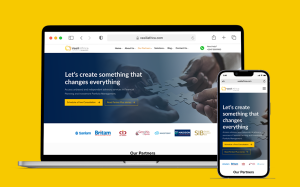In today’s digital age, where consumers are constantly bombarded with marketing messages, standing out from the crowd has become increasingly challenging for businesses. Traditional, one-size-fits-all marketing approaches are no longer as effective as they once were. That’s where the power of personalization comes in.
Personalization in digital marketing refers to the practice of tailoring marketing efforts to individual customers or segments, rather than treating all customers the same. This can be achieved through data and technology to deliver personalized experiences to customers. Personalization has revolutionized the way businesses engage with their target audience, enabling them to create meaningful connections and deliver tailored experiences.
In this article, we’ll explore why personalization is important in digital marketing and how businesses can use it to improve customer experiences and drive conversions.
Why is Personalization Important in Digital Marketing?
The importance of personalization cannot be overstated. Here are 8 reasons why:
- Improved customer experience:
Personalization can help improve the customer experience by providing them with content and offers that are relevant to their interests and needs. This creates a positive customer experience, as consumers feel valued and understood, which can ultimately lead to higher engagement and satisfaction levels. - Increased conversion rate:
Personalized marketing efforts are more likely to result in conversions, as they are targeted and relevant to the individual customer. When consumers feel that a brand understands their unique requirements and offers relevant solutions, they are more inclined to convert. This can lead to increased sales and revenue for businesses. - Enhanced customer loyalty:
Personalization plays a vital role in fostering brand loyalty. When customers receive personalized messages and offerings, they develop a stronger emotional connection with the brand. This connection leads to repeat purchases, increased customer retention, and positive word-of-mouth referrals. By consistently providing personalized experiences, businesses can cultivate a loyal customer base that becomes an invaluable asset in today’s competitive marketplace. - Better targeting:
Personalization allows businesses to target their marketing efforts to specific segments or individuals, rather than using a one-size-fits-all approach. This can lead to higher conversion rates and a better return on investment. - Increased relevance:
Personalization allows you to create content and offers that are highly relevant to your target audience. This relevance, in turn, increases engagement rates and conversions. - Better data insights:
Data is the foundation of effective personalization. By harnessing customer data and leveraging advanced analytics, businesses can gain valuable insights into customer behaviour, preferences, and purchase history. This, in turn, can be used to improve marketing efforts and drive further growth.
This data-driven approach enables marketers to segment their audience effectively, target specific customer segments with tailored messaging, and optimize marketing efforts based on real-time feedback. By leveraging data insights, businesses can make informed decisions, predict customer needs, and drive better results. - Improved customer engagement:
By crafting personalized content, businesses can capture the attention of their audience and generate higher levels of engagement. Personalized emails, product recommendations, and customized landing pages create a sense of exclusivity and relevance, encouraging customers to interact with the brand and take desired actions. This increased engagement can lead to higher click-through rates, longer website visits, and ultimately, increased conversions. - Gain a competitive advantage:
In today’s competitive marketplace, businesses need to find ways to differentiate themselves. Personalization provides a competitive edge by allowing businesses to deliver unique and relevant experiences. Customers are more likely to choose a brand that provides a personalized experience over one that offers generic, impersonal interactions. By investing in personalization, businesses can position themselves as customer-centric, forward-thinking, and ahead of their competitors.
How Can Businesses Use Personalization in Digital Marketing?
- Personalized email marketing: By using data such as customer preferences and purchase history, businesses can send personalized emails to customers with content and offers that are relevant to their interests.
- Personalized website experiences: Using data such as location and browsing history, businesses can personalize the content and offers displayed on their website for individual visitors.
- Personalized social media marketing: By targeting ads and content to specific segments or individuals on social media platforms, businesses can deliver personalized experiences to their audience.
It’s important to note that personalization should be used in a way that is respectful of customer privacy and data. This means obtaining consent for the use of personal data and being transparent about how it will be used.
Conclusion:
Personalization has emerged as a game-changer in digital marketing, enabling businesses to create meaningful connections with their target audience. By tailoring experiences, messaging, and offers to individual customers, businesses can enhance the customer experience, build trust, drive loyalty, increase conversion rates, and gain a competitive advantage.
As technology continues to advance, personalization will only become more crucial in meeting and exceeding customer expectations. Embracing personalization in your digital marketing strategy is no longer an option but a necessity for businesses that aim to thrive in the digital landscape.
*****
Shupav Group is supporting business owners to build and scale successful brands in Africa. We do this through pioneering Digital Marketing, PR & Communications, and Sales Enablement solutions. www.shupav.com











